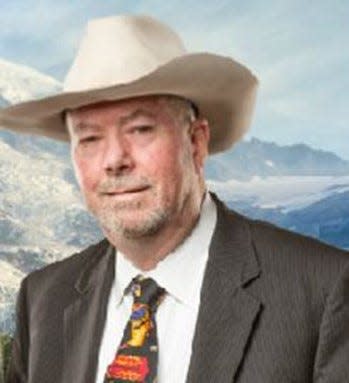The new La Quinta surveillance cameras are an emblem of our loss of freedom
Step by step, the panopticon is coming to our community. The 18th century British philosopher Jeremy Bentham designed the panopticon, a building configured to enable jailers to watch prisoners from a central location. Fewer jailers were needed to keep watch over more prisoners. It was one of the first steps toward a surveillance society.
Today, the reach of surveillance extends into the privacy of your home computer, laptop and phone, and keeps track of the websites we visit when using the internet.
Once I searched the internet for cuckoo clocks and the next day ads for cuckoo clocks began popping up on my screen while reading the newspaper online. I wondered, how did they – whoever they were – know I was interested in cuckoo clocks? Somebody somewhere was watching me surf the internet without my knowledge. Silent surveillance is growing day by day.
Thanks to a recent vote in the La Quinta City Council, everybody who drives down Highway 111 will be watched by license plate reading devices posted at highway intersections. Apparently, these readers are not intended to catch drivers who run red lights or speed, but simply to keep an eye on us.
Many eyes, in fact.
Law abiding drivers, fleeing bank robbers, tourists heading for a date shake, everybody, no matter who they are or what they are doing will be watched unwittingly by the police remotely and silently. With a photograph of the license plate captured by the camera and access to the state’s many databases, the police easily will determine who they are, where they live and if they own a firearm.
This is an ominous development. Protecting privacy and resisting control are two reasons to reconsider the wisdom of increased surveillance.
“The Right to Privacy,” published in the Harvard Law Review in 1890, first raised the alarm. Co-written by Louis Brandeis, who later became a Supreme Court justice, he argued for recognition of the right to be left alone. His immediate concern was unwanted publicity that invades a person’s private affairs, too often to fuel sensational stories about prominent people and sell newspapers.
There is no right to privacy in the U.S. Constitution. However, many decisions assert privacy interests are at stake in educating children, using birth control or same-sex relations, and many argue privacy interests are found in the First Amendment protection of religious belief, Fourth Amendment protection against unreasonable search and seizure, liberty interests protected in the 14th Amendment, and implied rights reserved to the people in the Ninth Amendment. In California, the state constitution was silent on the issue of privacy until 1972 when privacy become one of the inalienable rights. A right to privacy was added by initiative in 1974. Before the 1972 amendments, privacy rights were defined by various common law decisions allowing rights of action to sue for invasion of privacy.
The privacy issue with license plate readers on every corner of Highway 111 is not obvious. Isn’t that a public place? Of course it is, but I submit the government has no business following you as you lawfully drive down the street. Where you are going and when you crossed say, Washington Street or Jefferson Street is your own private business.
The issue of control also is not obvious. Busybodies favor asserting control over our daily lives. Progressives want to ban gasoline powered cars, natural gas stoves, single family houses and many other characteristics of modern life. Some demand we live in “15-minute cities” where autos are banned, public transport is required and you may live only where everything the government thinks you need is located within 15 minutes of where you live. In China, cameras with facial recognition software everywhere keep track of the Chinese to allocate social credit. Among other things, digital currency is intended to keep track of where you spend your money.
Each data point – too many to recite in this short article – individually may be well intentioned. Considered together they reveal an effort to control life in pursuit of the progressives’ favored response to issues of the day: climate change or racial injustice. Cameras that record a person’s movement down a highway are infrastructure for control. We are building our own panopticon.
Michael Bond is a retired Seattle lawyer, former U.S. Marine Corps JAG and part-time resident of La Quinta. His email address is michael@bondschambers.com

This article originally appeared on Palm Springs Desert Sun: The new La Quinta surveillance cameras: an ominous development
